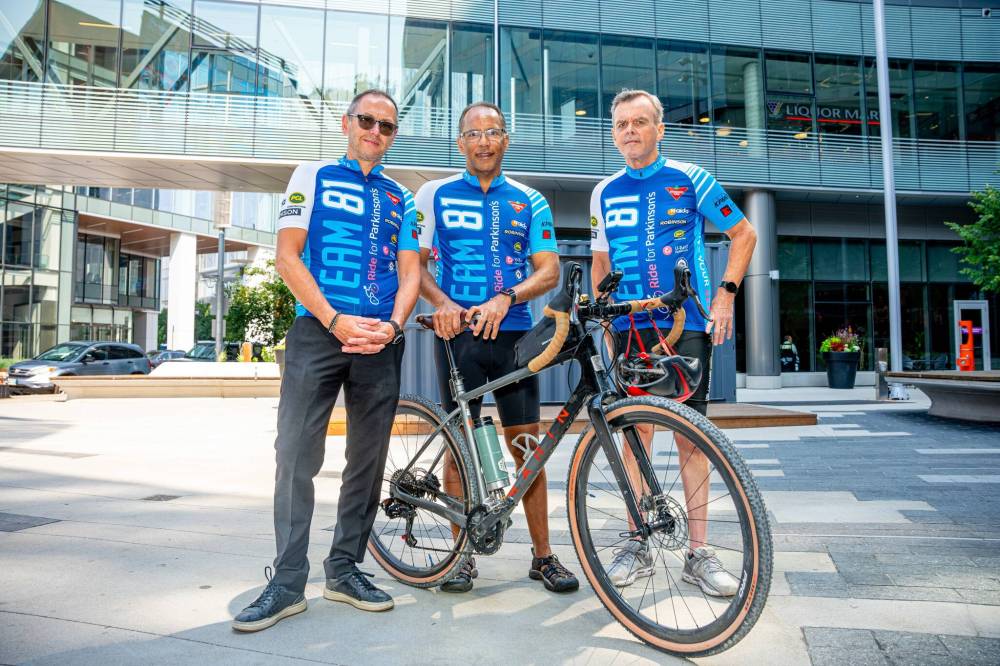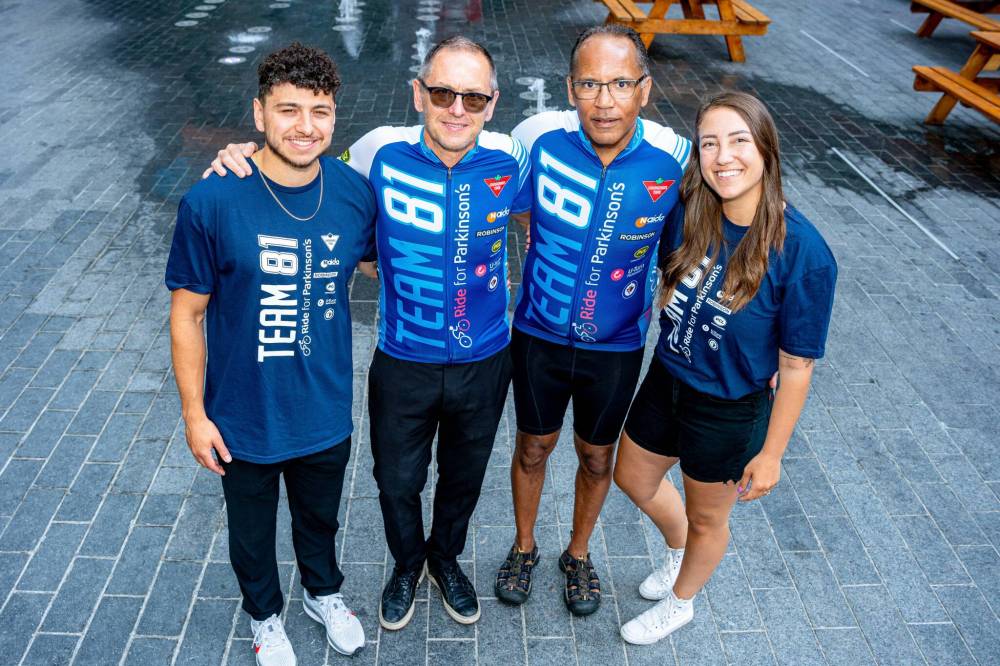A Winnipeg Jets sniper and a winner of a Canadian reality show are teaming up to fight Parkinson’s disease.
Left-winger Kyle Connor and U-Turn Parkinson’s founder Tim Hague have joined forces for the inaugural Team 81 Ride for Parkinson’s, which kicked off Saturday and wraps up Wednesday.
Hague, who won the first season of the reality TV show The Amazing Race Canada with his son, Tim Jr., is the founder and director of U-Turn Parkinson’s, a wellness centre in Winnipeg dedicated to helping people living with Parkinson’s through exercise and wellness programs.

The Team 81 Ride for Parkinson’s group has been on the road since Saturday and is expected at Assiniboine Park Tuesday.
The centre offers accessible, no-cost in-person and online classes, along with valuable community support.
The aim of the five-day, 550-kilometre cycling journey, which extends from Russell to Falcon Lake, is to raise funds and awareness. Hague, a retired nurse, was diagnosed with Parkinson’s in March 2011 at the age of 46.
“The money raised will go towards (U-Turn) programming and all the classes we put on for those living with the disease. It’ll also go towards saving up to open our own facility. We work out of the basement of a church right now,” Hague says.
The ride is made possible with the support of Connor, who also has a personal connection to Parkinson’s, having lost both his grandfather and father to the disease.
In April, the Winnipeg Jets hosted the Calgary Flames for the team’s Parkinson’s Awareness Game at Canada Life Centre. Nearly $100,000 was raised for U-Turn and the Movement Disorder Clinic, both of which provide classes, resources and support to patients with the disease.
Connor isn’t able to participate in the bike ride due to his recent nuptials, so he’ll be cheering on from the sidelines. For Hague, the support from both Connor and True North Sports and Entertainment has been overwhelming.
“I’m incredibly grateful to Kyle for his willingness to share his personal story. It takes a lot of vulnerability to open up like that, and not everyone is willing to do it. I’m very thankful he did that for his community,” Hague says.
Parkinson’s is a disorder of the nervous system that affects movement. It begins gradually and worsens over time. As the disease progresses, it robs people of co-ordination, strength and balance. Research shows it’s the fastest growing neurological disease in the world and is the leader in causing permanent disability.
Earlier this year, Hague learned about other fundraising bike rides aimed at raising awareness for Parkinson’s disease and felt inspired to organize a local event. He shared the idea with Kevin Donnelly of True North. Their personal connection — Hague’s daughter, Jordana, is marrying Donnelly’s son, Chris, next fall — helped fuel Donnelly’s passion for raising awareness and support.
“I said, ‘Tim, you had me at hello. I’m in,’” says Donnelly, an avid cyclist. “I know some cyclists and we know how to organize a ride, so I told Tim I could assemble a group.”

From left: True North Sports senior vice-president Kevin Donnelly, U-Turn Parkinson’s founder Tim Hague and Blair Sigurdson
Donnelly is no stranger to organizing large-scale events. As senior vice-president of venues and entertainment for True North, he’s the mastermind behind bringing some of the biggest acts to Winnipeg, such as Bruce Springsteen this November.
“I made a few calls and set out to build a little committee that could move things from discussion to reality.”
Donnelly is also well-versed in long-distance cycling. After completing 40 marathons, his knees no longer allow him to run, so he turned to cycling and has been riding consistently for about 15 years. He’s completed cycling trips across Canada, the U.S. and Europe, including 12 rides through France.
Aware of Connor’s connection to the disease, Donnelly reached out to him and the Jets suggesting they combine their efforts — and Team 81 Ride for Parkinson’s was born.
“Kyle has become our flag-waving ambassador for the effort,” Donnelly says.
The Team 81 Ride for Parkinson’s group also plans to visit health-care centres along the route, including facilities in Russell, Brandon and Portage la Prairie, to help raise awareness.
“We want to link the ride with the health-care industry and those providing services. While the ride itself is important, it’s also crucial to connect with the people you’re engaging with and those who could benefit from the fundraising efforts,” Donnelly explains.
Although there is no known cure, various studies support the idea that rigorous exercise can benefit those with the disease and help mitigate symptoms.
In particular, research suggests regular cycling offers significant benefits for people with Parkinson’s. Depending on the pace and intensity, cycling has been shown to improve overall motor function and reduce tremors.
Last year, the team at the department of human health and nutritional sciences at the University of Guelph, led by Philip Millar, studied a 57-year-old man with Parkinson’s disease before and after an arduous 7,850-km cross-country cycling trip in 2022.
“U-Turn Parkinson’s was born out of a desire to help people with Parkinson’s exercise and get them moving.”– Tim Hague
According to Millar, the changes were “profound,” suggesting that additional exercise can help those with Parkinson’s manage their symptoms and disabilities.
The study, which appears in the journal Physiological Reports, showed a 44 per cent decrease in the man’s motor symptoms score on the Parkinson’s Disease Rating Scale and a 32 per cent decrease on a test measuring Parkinson’s fatigue.
“U-Turn Parkinson’s was born out of a desire to help people with Parkinson’s exercise and get them moving,” Hague says. “Types of exercise where you’re at 80 per cent of your heart rate and sweating for at least 30 minutes are proving to make a difference in slowing down the progression of the disease.”
Parkinson’s affects more than 100,000 Canadians, with 30 new diagnoses every day, according to Parkinson’s Canada.
The degenerative neurological disorder impacts movement and can significantly affect the lives of those diagnosed. As of 2022, the Canadian Chronic Disease Surveillance System reports that more than 4,000 Manitobans aged 40 and older are living with Parkinson’s disease, with an average wait time to see a specialist of eight months.
Diagnosed with Parkinson’s 13 years ago, Blair Sigurdson, 63, joined Team 81 Ride for Parkinson’s as a way to keep up with his fitness.

True North Sports senior vice president Kevin Donnelly (centre left) and U-Turn Parkinson’s Founder Tim Hague (centre right) with their children Chris Donnelley (left) and Jordana Hague.
“This will be a challenge for me, like a bucket list sort of thing,” he says.
Since his birthday in June, Sigurdson has logged more than 500 km of training for the upcoming ride and he says riding a bike feels like “freedom.”
“Walking can be difficult for me because I struggle with balance and tripping, but when I get on a bike, that’s all gone. My balance becomes better and I can think more clearly,” he says.
Sigurdson, a friend of Hague, has been a member at U-Turn since it opened in 2016.
“The classes have helped me a lot. Their boxing program, especially. It helps retrain your brain to make certain movements again,” he says.
Sigurdson attributes his ability to participate in the Ride for Parkinson’s to a surgical treatment he underwent five years ago called deep brain stimulation (DBS.)
In DBS surgery, thin wires called electrodes are placed into one or both sides of the brain. These electrodes are connected to a battery-powered device, usually placed under the skin below the collarbone.
The device, known as a neurostimulator, works like a heart pacemaker, using electric pulses to regulate brain activity. DBS can help reduce the symptoms of tremors, slowness, stiffness and walking problems associated with Parkinson’s disease.
“I just had a new battery put in (to my device)] That was a huge change. It felt like I was free again and it’s probably why I’m able to do this bike ride,” Sigurdson says.
Most people are able to decrease (though not completely discontinue) their Parkinson’s medications after DBS. Sigurdson went from taking 32 pills a day to nine. Hague, who also had the procedure done in March, was able to cut his pill intake by about half.
Team 81 hopes to raise $100,000 in their inaugural year.
“Reaching $100,000 in Year 1 is kind of monumental,” says Donnelly.
For those wanting to cheer the riders on, Team 81 will be stopping in Winnipeg on their cycle across Manitoba on Tuesday at Assiniboine Park from 2 p.m. to 4 p.m. People are invited to meet the team and participate in a family-friendly bike ride through the park.
fparts@freepress.mb.ca

Sabrina Carnevale
Columnist
Sabrina Carnevale is a freelance writer and communications specialist, and former reporter and broadcaster who is a health enthusiast. She writes a twice-monthly column focusing on wellness and fitness.
Our newsroom depends on a growing audience of readers to power our journalism. If you are not a paid reader, please consider becoming a subscriber.
Our newsroom depends on its audience of readers to power our journalism. Thank you for your support.